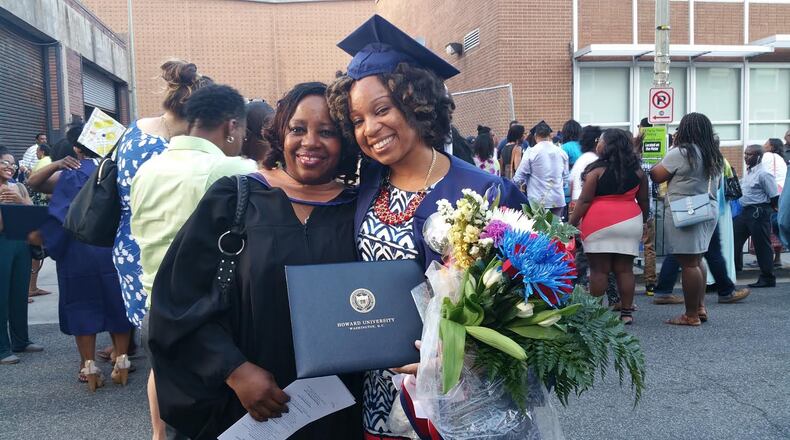People thought I was a Bison long before I became one in graduate school. Howard University alumni are everywhere and surrounded me at most places I've worked. They make their presence known. They walk on air. They stick together, embracing fellow graduates as they move forward.
These characteristics may seem similar to those of loyal alumni from almost any school, but Bison love is somehow different from Aggie pride at North Carolina A&T State University or even Buckeye fever at The Ohio State University, where I earned a bachelor's degree in journalism.
Take our homecoming, for instance, a weeklong experience that's touted in a Ludacris verse. It consumes the nation's capital, with so many alums and wannabe Bison descending upon campus each October and pumping significant coin into the local economy. We have to remind students that it really isn't a federal holiday.
But this is the Mecca, after all. The Real HU (no matter what our rivals try to say at the school formerly known as Hampton Institute).
The originator of the "Quiet Storm" radio format.
The place where Dr. Charles Drew, a pioneer in preserving blood plasma, served as chief surgeon.
The academic home of Thurgood Marshall, Toni Morrison, Gen. Benjamin O. Davis and Zora Neale Hurston, for starters.
I've worked at the New York Times, I've run magazines — even started one — but nothing stands out as much as my current occupation. "You teach at Howard?" people ask with awe. "She teaches at Howard!" others exclaim pointing in my direction.
Sometimes I'm in awe myself. Teaching is my most fulfilling role professionally. I understand why my father continued to teach long after retirement — to the point that I had to turn in his grades while planning his funeral. He was proud that I followed in his footsteps, but he seemed even more elated that I was doing it at Howard. I put one of his magnets in my office that reads: "I touch the future. I teach."
I have the best of both worlds. I teach what I do and do what I teach, to paraphrase a fellow professor. In the Department of Media, Journalism and Film, we tell stories. And we nurture those skills, and the theories behind them, across multimedia platforms in our students. We nurture them holistically, too, instilling that trademark sense of confidence steeped in history, legacy and purpose; that ability to walk on air. We help to prepare them for the good, the bad and the ugly so that they can rise above it.
Many colleagues and I could work anywhere; teach anywhere. Many of us continue to field offers from industry and academia, but we want to be at Howard. So do our students. Howard still attracts some of the best among the best and the brightest. Applications are up 24 percent, and SAT scores for accepted freshmen exceed the national average for black students.
Integration may have led some to believe that HBCUs are no longer needed — that they've fought the good fight and finished the course. Despite challenges that we all face, Historically Black Colleges and Universities are still often the best option for students with the least — and for those with the most. No matter where they fall on the spectrum, we help students imagine possibilities beyond where they are, dream big and achieve those dreams while making a difference in the world.
We really practice what we preach when we talk about "leadership for America and the global community." We teach our students about true representation, down to the finer points of images and words. They learn to push beyond themselves for diversity that rises above lip service and window dressing. They are working throughout the diaspora. They are running things — colleges, companies, cities and countries.
My experience at Howard has come full circle. As a high school student in Akron, Ohio, I fell in love with the idea of Howard at a recruitment fair, but decided to stay in state. That love blossomed during my sophomore year at Ohio State on the first of three annual bus trips to attend Howard's communications conference and job fair.
We had a sense of Howard's history as we walked around campus, witnessed the bond between faculty and students, listened to inspiring speakers and met leading role models of the day. We wanted to bottle our experience — from the plays to the parties — and take it back with us.
Although we out-of-towners held our own, the Howard students stood out. The consensus was that they were confident and polished with impressive portfolios to back it up — and a lock on any opportunities at the conference. They were learning to walk on air, while remaining down to earth. I became lifelong friends with some of them as we stood in line for interviews, and I landed my first internship.
This is still the consensus on Howard students. I'm proud to have even a small role in helping to shape our leaders of tomorrow. It's such a joy to watch them begin their journeys as they walk across the stage during commencement ceremonies — especially those who had to overcome challenges. And when the grandmas seek me out for hugs and thanks, I'm rendered speechless.
I'm glad that I've answered the call to serve and to strengthen Howard's role as the Mecca — not just among HBCUs, but also among colleges and universities, period.
Yanick Rice Lamb, a member of the MBA class of 2005, is chair of the Department of Media, Journalism and Film at Howard University. She's also co-founder of FierceforBlackWomen.com and a former copy editor at the Atlanta Journal-Constitution.
About the Author
Keep Reading
The Latest
Featured
